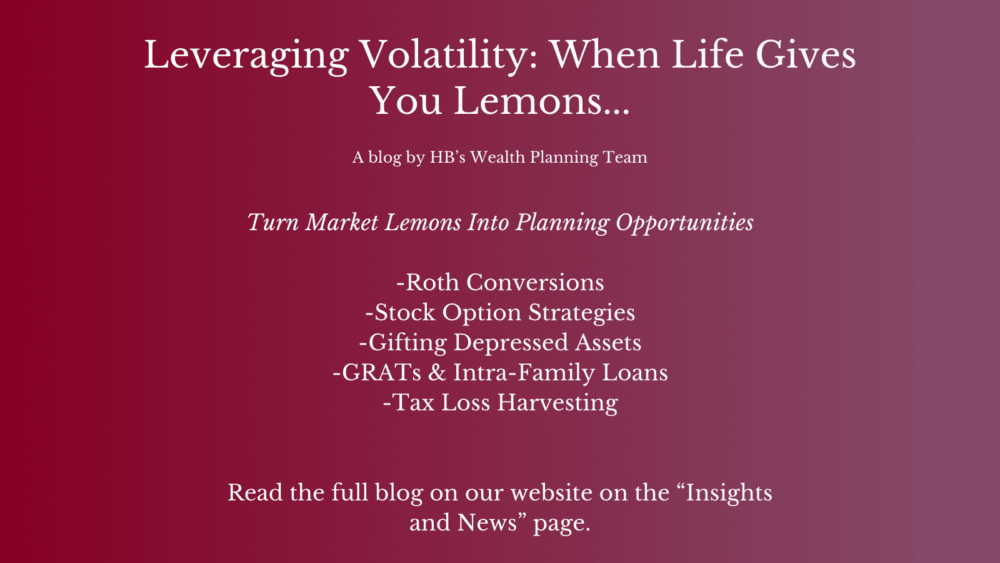By: HB Wealth Planning Team
As the threat of a tariff-induced trade war, inflationary pressures, and domestic legislative and geopolitical uncertainties continue to fuel volatility, the emotional response might be to hunker down and take a wait-and-see approach. While certainly prudent, challenging times also present volatility-induced opportunities to leverage these forces to benefit tax and estate planning strategies. Consider the following:
Income Tax Planning
- Employer Stock Options: Temporary market declines present distinctive opportunities for vested but unexercised non-qualified (NQSO) or incentive stock options (ISO). Compensatory stock options are taxed as ordinary income on the appreciation above the grant price at the point of exercise. Exercise while underlying stock values are temporarily lower can potentially convert the taxation of post-exercise stock appreciation into long-term capital gain when stock is sold (if held > 1 year before sale). Also, through 2025, ISO exercise may be sheltered from the Alternative Minimum Tax (AMT), as current law provides significantly higher exemptions and phaseouts.
- Explore Roth IRA Conversions: Converting traditional IRAs to Roth when portfolio values are low may result in a lower overall income tax liability, as the growth associated with a market recovery and all subsequent appreciation accrues and is distributed tax-free during retirement.
- Tax Loss Harvesting: While proactive tax loss harvesting should be a strategic and regular part of prudent portfolio management, market dislocations and downside volatility present distinctive opportunities to replace or rebalance portfolio holdings and enhance your overall after-tax returns.
- Cryptocurrencies: Unlike securities, directly owned cryptocurrencies are not subject to the IRS wash-sale rule. Accordingly, crypto can be simultaneously sold and repurchased, thereby harvesting losses while always maintaining the desired economic exposure.
- Qualified Opportunity Zone Deferrals: Capital gains realized through partnership or other pass-through entities in 2024 may still be eligible to reinvest in Qualified Opportunity Zone assets through early September 2025. While under current law, Qualified Opportunity Zone deferrals will sunset on December 31, 2026, it is rumored that the deferral period may be extended under the 2025 Tax Legislation.
Estate Planning
- Lifetime Gifts to Family: Gifting marketable securities at depressed valuations may further enhance the transfer tax planning opportunities under already generous federal estate, gift, and generation skipping transfer tax exemptions. For larger gifts, always consider utilizing trusts that can provide multi-generational estate, asset protection, governance, and even state tax planning benefits.
- Intrafamily Loans: Inflation is lingering, and interest rates may again be on the rise. Now may be an ideal time to review and refine the terms on existing loans to family members. While rates are fluctuating, assessing opportunities for recently structured or soon-to-expire loans may be timely.
- Grantor Retained Annuity Trusts (GRATs): Funding a new GRAT with temporarily mispriced securities, poised to rebound, can shift significant wealth to a family with little or no gift tax.
- Asset Substitutions: Existing GRATs, whether under-performing or successful, should be reviewed to determine if substituting lower volatility assets of equal value should be used to either reset unsuccessful trusts or lock-in the wealth transfer benefits of fruitful planning.
- Late Generation Skipping Transfer Tax (GSTT) Exemption Allocations: Prior year gifts to partially or non-GSTT exempt trusts may benefit from late allocations at lower trust asset values.
As with any tax strategy, before considering these or other tactical planning opportunities, consult with your advisors to carefully consider the impact any actions may have on your overall investment, wealth, and income tax planning goals. With 2025 shaping up to be a volatile year, creatively embracing and leveraging volatility to optimize tax planning may just make lemonade from the recent market’s lemons!
Written and edited by HB Wealth Planning with significant contributions by Director of Financial Planning, Isaac J. Bradley, J.D., CPA, CFP®, and Director of Advanced Tax Planning & Family Office Services, Timothy M. Tallach, J.D., CPA.
To learn more or get help with your tax strategy, please visit us at homrichberg.com, send an email to info@hbwealth.com, or call 404.264.1400.
Important Disclosures
This article may not be copied, reproduced, or distributed without Homrich Berg’s prior written consent.
All information is as of date above unless otherwise disclosed. The information is provided for informational purposes only and should not be considered a recommendation to purchase or sell any financial instrument, product or service sponsored by Homrich Berg or its affiliates or agents. The information does not represent legal, tax, accounting, or investment advice; recipients should consult their respective advisors regarding such matters. This material may not be suitable for all investors. Neither Homrich Berg, nor any affiliates, make any representation or warranty as to the accuracy or merit of this analysis for individual use. Information contained herein has been obtained from sources believed to be reliable but are not guaranteed. Investors are advised to consult with their investment professional about their specific financial needs and goals before making any investment decision.
This material does not constitute an offer, solicitation or recommendation to sell or purchase any security.
©2025 Homrich Berg.













A Deeper Look At The U.S. Labor Market And How It Continues To Support Consumer Spending
Last month, we discussed how recent inflation data could influence the Federal Reserve’s (Fed) decision…
Read More